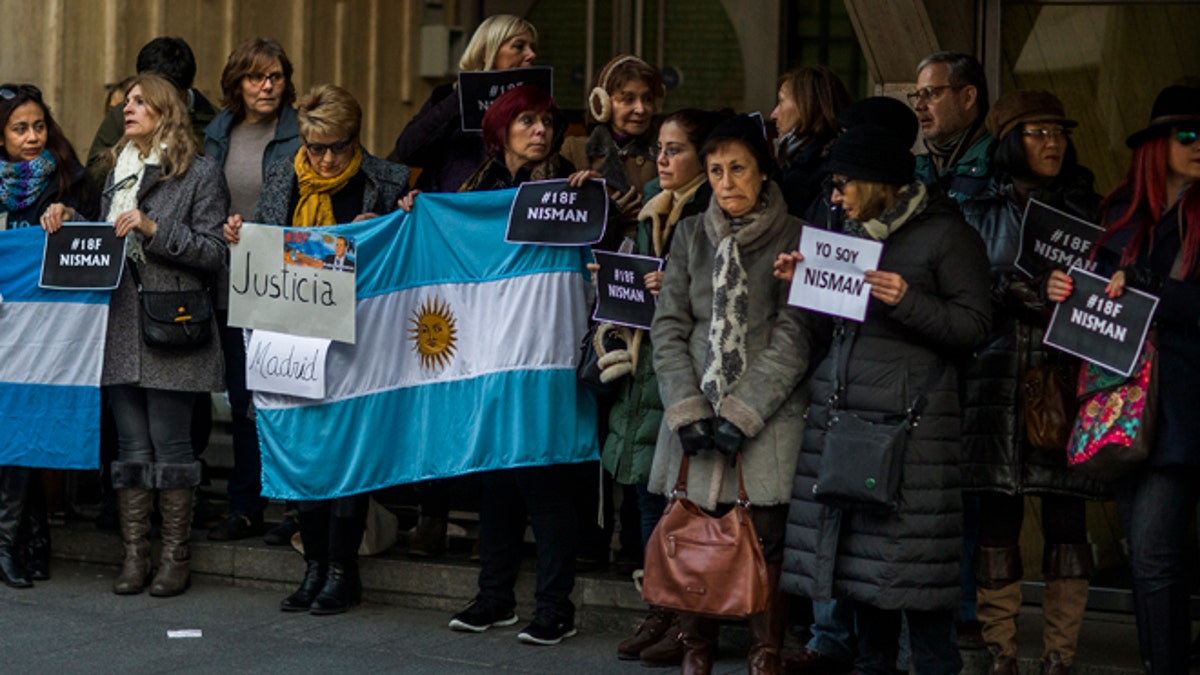
People hold signs reading in Spanish "Justice" and "I am Nisman" as they gather for justice and against impunity in the case of the mysterious death of late prosecutor Alberto Nisman outside the Argentinean Embassy in Madrid, Spain, Wednesday, Feb. 18, 2015. Nisman was scheduled to appear before Congress the day after he was found dead in his apartment on Jan. 18, to detail his allegations that President Cristina Fernandez had conspired to protect some of the Iranian suspects in the 1994 bombing of a Jewish center. (AP Photo/Andres Kudacki)
What next?
After a tumultuous year that's included a tanking economy, a declaration of bankruptcy, allegations of corruption about both the sitting president and vice president, you could perhaps forgive Argentinians if they seem somewhat weary – and that's heading into a heated presidential campaign season.
The chapter on one national trauma appeared to close last week when federal judge Daniel Rafecas rejected allegations that President Cristina Fernández de Kirchner orchestrated a cover up of Iran's role in the 1994 bombing of a Jewish center in Buenos Aires.
"Argentina has waited 20 years for a resolution to the biggest terrorist attack on their country and we're no closer," Jason Marczak, the deputy director at Atlantic Council's Adrienne Arsht Latin America Center told Fox News Latino. "One thing that is certain is that this will not be a priority for President Fernández during her last months in office."
Looming over Argentina's political landscape in the upcoming months will be a slew of tough questions: Where will the probe into the bombing go? What will happen with the investigation of the death of Alberto Nisman – the prosecutor found dead in his Buenos Aires apartment under mysterious circumstances just hours before he was scheduled to detail his charges against Fernández? Will the protests against her administration continue? How will the turmoil wind up affecting the presidential election this October?
And what, exactly, will Fernández do with her remaining, functionally lame-duck time in office?
"She should call for an independent investigation into the accusations," Chris Sabatini, a professor of Latin American police at Columbia University told FNL. "She needs to show some sort of acceptance of credibility and a human response."
Sabatini, however, added: "That doesn't seem to be in her DNA."
The investigation into the AMIA bombing – as the Jewish center attack is known – by Nisman, and subsequent work by prosecutor Gerardo Pollicita, included intercepted conversations between Iranian and Argentine government officials and secret meetings in Syria at which, allegedly, Foreign Minister Héctor Timerman suggested that Argentina would no longer be interested in investigating the AMIA attack if Iran were willing to supply the cash-strapped Latin American country with inexpensive oil.
The allegations damaged Fernández's already ragged stature at home and abroad while creating even more fractures in a deeply divided nation.
The president handled the situation – and the subsequent investigation into Nisman's death – in a combative, inconstant manner, leveling accusations against political opponents and flip-flopping on her commitment to solve the prosecutor’s death, which didn't convince many of those who were predisposed to oppose her.
On Sunday, Fernández used much of her four-hour speech marking the opening session of the Argentine Congress either defending herself from Nisman’s allegations or attempting to co-opt people's outrage over them.
"Don't come talking to me about AMIA," the president said. "Twenty-one years have passed [since the bombing] and not a single person has been convicted, not a single one sent to jail."
Many observers say Rafecas’ dismissal of the case allows her to redeem some stature both at home and abroad. It also may help her avoid prosecution after she leaves office, as Argentinian lawmakers are protected from prosecution while serving their posts.
Pollicita has vowed to appeal the ruling by the judge, but whether he is successful or not, the furor that is engulfing Argentina doesn’t appear to be dissipating.
"This is a presidential campaign year, and there will be a shadow hanging over the campaign," Marczak said.
The Nisman investigation is only the latest in a series of scandals and problems that haven engulfed her presidency, starting with double-digit inflation, rising poverty and unemployment and continuing through to her sitting vice president, Amado Boudou, being indicted in two separate corruption cases.
Unsurprisingly, most presidential candidates are expected to distance themselves from Fernández.
Around 64 percent of Argentinians disapprove of her governing and 77 percent want her successor to change some of the laws she has pushed through Congress, according to a recent poll by Management Fit.
Experts agree that whoever replaces Fernández will have a difficult time repairing the damage done domestically and in the global community.
"Under Fernández there has been a constant churning away of the political standing of Argentina," Marczak said.




